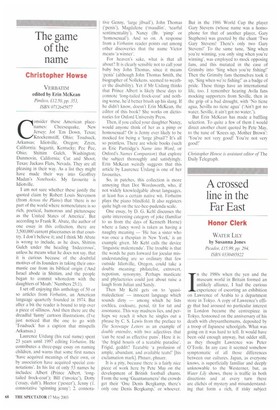The game of the name
Christopher Howse
VERBATIM edited by Erin McKean Pimlico, £12.50, pp. 353, ISBN 0712645977 Consider these American place names: Cheesequake, New Jersey; Jot 'Em Down, Texas; Knockemstiff, Ohio; Toadsuck, Arkansas; Idiotville, Oregon; Zzyz.x., California; Sugartit, Kentucky; Pee Pee, Ohio; Shittim Gulch, Washington; Dunmovin, California; Cut and Shoot, Texas: Jackass Flats, Nevada. They are all pleasing in their way. As a list they might have made their way into Geoffrey Madan's Notebooks. My favourite is Idiotville.
I am not sure whether these justify the quoted claim by Robert Louis Stevenson (from Across the Plains) that 'there is no part of the world where nomenclature is so rich, poetical, humorous and picturesque as the United States of America'. But according to Frank R. Abate, the author of one essay in this collection, there are 3,500,000 current placenames in that country. I don't believe it; and I think Mr Abate is wrong to include, as he does, Shittim Gulch under the heading 'Indecorous', unless he means what he does not say, that it is curious because of the doubtful motives of its founders in taking their onomastic cue from its biblical origin (And Israel abode in Shittim, and the people began to commit whoredom with the daughters of Moab,' Numbers 25:1).
I set off enjoying this anthology of 50 or so articles from Verbatim, an American language quarterly founded in 1974. But after a bit the reader is bound to trip over a piece of silliness. And then there are the dreadful 'funny' cartoon illustrations. (Eve just noticed that the one to go with 'Toadsucke has a caption that misspells Arkansas.) Laurence Urdang (his real name) spent 23 years until 1997 editing Verbatim, He contributes a three-page essay on naming children, and warns that some first names 'have acquired meanings of their own, or by association have acquired special connotations'. In his list of only 53 names he includes: Albert (Prince Albert, `longtailed frock-coat'); Bill (Invoice), Dotty ('crazy, daft'). Hector (pester), Jenny (1. connotative 'spinning jenny'; 2. connota live Genny, 'large jibsail'), John Thomas (penis), Magdalene ('maudlin', 'tearful sentimentality), Nancy (Br. 'pimp' or 'homosexual'). And so on. A response from a Verbatim reader points out among other discoveries that the name Victor means 'a winner'.
For heaven's sake, what is that all about? It is clearly sensible not to call your baby boy John Thomas. since it means 'penis' (although John Thomas Smith, the biographer of Nollekens, seemed to weather the disability). Yet if Mr Urdang thinks that Prince Albert is likely these days to connote `long-tailed frock-coat' and nothing worse, he'd better brush up his slang. If he didn't know, doesn't Erin McKean, the editor of this book? She works on dictionaries for Oxford University Press.
Then, if you called your daughter Nancy, would anyone think of her as a pimp or homosexual? Or is Jenny ever likely to be mocked for being a 'large jibsail'? It's all so pointless. There are whole books (such as Eric Partridge's Name into Word, or Oxford's Names Companion) that explore the subject thoroughly and satisfyingly. Erin McKean weirdly suggests that this article by Laurence Urdang is one of her favourites.
So, in patches, this collection is more annoying than Dot Wordsworth, who, if not widely knowledgable about languages, at least has a certain native wit. Verbatim plays the piano blindfold. It also registers quite high on the tee-hee-pudenda scale.
One essay. by D. G. Kehl discusses the quite interesting category of joke (familiar to us from the days of Kenneth Horne) where a fancy word is taken as having a naughty meaning — 'He has a sister who was once a thespian in New York,' is an example given. Mr Kehl calls the device 'linguistic malentendu'. The trouble is that the words he puts forward for jocular misunderstanding are so ordinary that few outside Idiotville, Oregon, could take a double meaning: philatelist, extrovert, nepotism, synonymy. Perhaps masticate and phylacteries could just about raise a laugh from Julian and Sandy.
Then Mr Kehl gets on to 'quasimalediction— innocent language which sounds dirty — among which he lists cochlea, cocksure, penal, tit for tat and assonance. This way madness lies, and perhaps we reach it when he singles out a phrase by C. S. Lewis from the preface to The Screwtape Letters as an example of double entendre, with two adjectives that 'can be read as effective puns'. Here it is: 'the frigid houris of a teatable paradise'. Frigid, geddit? Teatable 'a profusion of ample, abundant, and available teats!' [his exclamation mark]. Phnarr, phnarr.
It is a pity, because there is a fairly nice piece of work here by Pete May on the development of British football chants. From the song `Guantanamera' the crowds get their 'One Denis Bergkamp, there's only one Denis Bergkamp,' or whoever. But in the 1986 World Cup the player Gary Stevens (whose name was a homophone for that of another player, Gary Stephens) was greeted by the chant Two Gary Stevens! There's only two Gary Stevens!' To the same tune, 'Sing when you're winning, you only sing when you're winning', was employed to mock opposing fans, and this mutated in the case of Grimsby into 'Sing when you're fishing!' Then the Grimsby fans themselves took it up, 'Sing when we're fishing!' as a badge of pride. These things have an international life, too. I remember hearing Avila fans mocking supporters from Seville, then in the grip of a bad drought, with 'No tiene agua, Sevilla no tiene agua' (Ain't got no water. Seville, it ain't got no water.).
But Erin McKean has made a baffling selection. To quite a few of them I would direct another chant quoted by Pete May, to the tune of 'Knees up, Mother Brown': 'You're not very good! You're not very good!'
Christopher Howse is assistant editor of The Daily Telegraph.


































































































 Previous page
Previous page